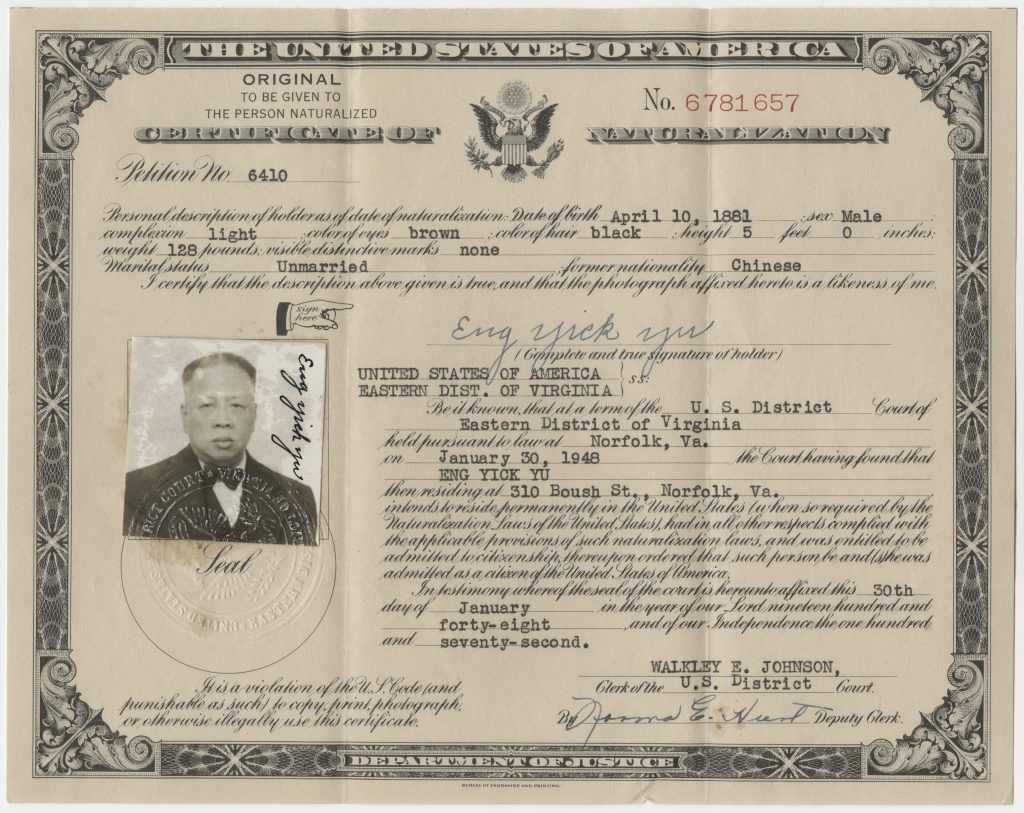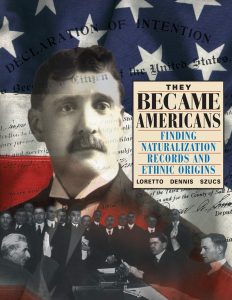
A Guide to Getting Started
Finding APIDAs in the Library of Virginia Digital Collections
APIDA Archival Resources at the Library of Virginia
APIDA Selected Secondary Resources
APIDA Genealogical Resources
Other APIDA Digital Resources & Archives

A Guide to Getting Started
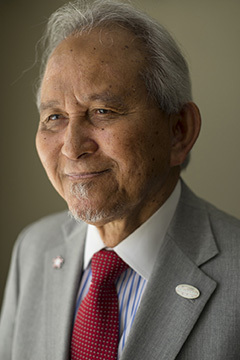
Photo by Pat Jarrett/Virginia Humanities.
The history of Asian Pacific Islander Desi Americans (APIDAs) is an important part of the American experience. Works dedicated to APIDAs contribute to a fuller understanding of the history of the United States. Their stories encompass a rich legacy of achievement, along with hardships and sacrifices, that deserve to be explored.
There are a number of terms that are used to denote Asian and Pacific Islander populations, including Asian Pacific American (APA), Asian American Pacific Islander (AAPI), and Asian American Native Hawaiian Pacific Islander (AANHPI). We use the term APIDA, which stands for Asian Pacific Islander Desi American, as a pan-ethnic classification that intentionally includes South Asians (Desi) as part of the community. There is a great diversity of identities and ethnicities encompassed under the APIDA umbrella, including East Asian, South Asian, Southeast Asian, and Pacific Islander. This term ultimately includes all people of Asian, Asian American and Pacific Islander ancestry who trace their origins to the countries, states, jurisdictions and/or the diasporic communities of these geographic regions.
Historically, APIDAs were grouped together by government classifications. There are conflicting views on the appropriateness of any classification or reference. While these communities use various names to describe themselves; these groupings are ultimately political and part of a dynamic, continuing process of self-determination and self-identification.
In 1997, the federal Office of Management and Budget created standards for race and ethnicity that are still used by the United States Census Bureau. The federal government defines “Asian American” to include persons having origins in any of the original peoples of the Far East, Southeast Asia, or the Indian subcontinent. “Native Hawaiian and Other Pacific Islander” includes Native Hawaiian, Samoan, Guamanian or Chamorro, Fijian, Tongan, or Marshallese peoples and encompasses the people within the United States jurisdictions of Melanesia, Micronesia and Polynesia. The previous “Asian and Pacific Islander” (API) category was separated into “Asian Americans” and “Native Hawaiians and Other Pacific Islanders” In our references, Desi countries of origin include Afghanistan, Bhutan, Bangladesh, India, Maldives, Nepal, Pakistan, and Sri Lanka. The U.S. Census Bureau provides current and historical population data.
APIDAs are generally grouped by regions, although it is important to note that some of these can be politically controversial. There is tremendous diversity, with Asia having more than 40 countries, and there are more ethnicities than countries (for example, the Hmong are an ethnic group from Laos). Asian diasporas are extremely large and ethnic identity oversimplifications do not apply. For example, people of Japanese origin in Brazil culturally identify as Brazilians, those of Chinese origin in Guatemala identify as Guatemalans; whereas hyphenated identities are more common in the United States as evidenced by terms like Asian American, or Korean American.
Notions of ethnic and national identity carry political, social and familial meanings too complex to analyze here. See
https://www.api-gbv.org/resources/census-data-api-identities/ for more on identity and statistics.
- Central Asians Afghani, Armenian, Azerbaijani, Georgians, Kazakh, Kyrgyz, Mongolian, Tajik, Turkmen, Uzbek
- East Asians Chinese, Japanese, Korean, Okinawan, Taiwanese, Tibetan
- Native Hawaiians and Pacific Islanders (in the United States Jurisdictions & Territories) Carolinian, Chamorro, Chuukese, Fijian, Guamanian, Hawaiian, Kosraean, Marshallesse, Native Hawaiian, Niuean, Palauan, Pohnpeian, Samoan, Tokelauan, Tongan, Yapese
- Southeast Asians Bruneian, Burmese, Cambodian, Filipino, Hmong, Indonesian, Laotian, Malaysian, Mien, Papua New Guinean, Singaporean, Timorese, Thai, Vietnamese
- South Asians Bangladeshi, Bhutanese, Indian, Maldivians, Nepali, Pakistani, Sri Lankan
- West Asians This is a contested term, most people from the region do not self-identify as such. West Asia is typically referred to as the Middle East; and geographically includes the countries of Bahrain, Iran, Iraq, Israel, Jordan, Kuwait, Lebanon, Oman, Palestine, Qatar, Saudi Arabia, Syria, Turkey (straddles Europe and Asia) United Arab Emirates and Yemen
The guides below will help you to navigate a number of APIDA resources and tools, both from the Library of Virginia and from other great resources.
- APIDA Archival Research at the Library of Virginia
- APIDA Selected Bibliography at the Library of Virginia
- Comprehensive Bibliography of Selected Published Sources for APIDA Research in Virginia
At the Library of Virginia
Local History and Genealogy Room
In the Library of Virginia, the Local History and Genealogy Room features a rotating case which highlights collection materials and stories.
During May 2023, there is an exhibit on the origins of the federal and Virginia observances of Asian American and Pacific Islander Heritage Month.
A new exhibit on the 20th anniversary of the Virginia Asian Advisory Board opens in the Library’s Local History and Genealogy Room on May 2. This Board’s purpose is “to advise the Governor on ways to improve economic and cultural links between the Commonwealth and Asian nations, with a focus on the areas of commerce and trade, art and education, and general government, and on issues affecting the Asian-American communities in the Commonwealth.” Although the Board was created in 2001, the first members were not appointed until 2003.
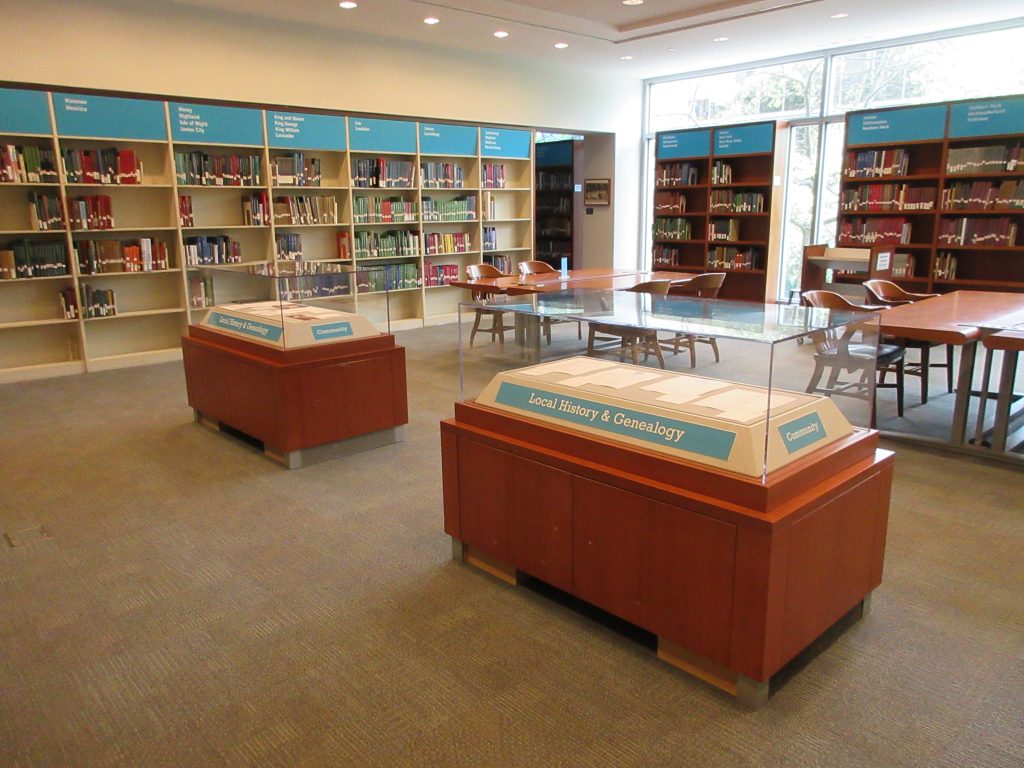
Finding Asian Pacific Islander Desi Americans (APIDAs) in the Library of Virginia Digital Collections
The UncommonWealth
Check out Library of Virginia’s blog, The UncommonWealth, to learn about what we do, why we do it, and how our efforts relate to current issues and events. In addition to our intriguing collections and groundbreaking projects, we spotlight public libraries, staff members, and specialized professions. Below are entries that spotlight APIDAs in our collection.
- “Governor L. Douglas Wilder and the Japan External Trade Organization (JETRO): ‘Greater Opportunities’ “
- “May Is Asian American and Pacific Islander Heritage Month!”
- “Finding Asian Pacific Islander Desi Americans in the U.S. Census”
- “Enormous Opportunities:” Governor Mark R. Warner’s 2005 Trade Mission to Japan and India”
- “Triple Murder Mystery in Prohibition-Era Hampton Roads”
- “Asian American And Pacific Islander Heritage Month 2022 at the Library of Virginia”
- “Universal Leaf Tobacco Company of China, Federal, Inc., U.S.A.”
- “Whiteness on Trial: Asian Americans and the Right to Citizenship“
- “The Creation of the Virginia Asian Advisory Board“
- “The Marriage of Cadet Captain-Quartermaster Woo Ging Tang”
- “Random Reference: Language Lessons”
- “Asian American and Pacific Islander Heritage Month 2021”
- “The Apprenticeship Indenture of Ah Man, Princess Anne County, 1860”
- “Finding Asian Pacific Islander Desi Americans (APIDAs) in Virginia Newspapers”
- “A Refugee’s Journey from Cambodia to California: Kuy So’s Unclaimed Property File”
- “In Between: Japanese and Japanese Americans in Jim Crow Virginia”
- “The Evolution of May as Asian American and Pacific Islander Heritage Month”
- “May is Asian American and Pacific Islander Heritage Month!”
- “Abandoned Papers: The Naturalization Certificates of Ow Chuck Sam and Eng Yick Yu”
- “The High Cost of Entertainment: Chang and Eng Go to the General Assembly”
- “Vestiges of Vietnam: Gathering Stories of the Refugee Experience”
Broadside
The Library of Virginia’s quarterly magazine, a membership benefit of the Semper Virginia Society, describes and illustrates the rich holdings and diverse happenings at the Library of Virginia. Broadside offers news about events, exhibitions, and educational programs; illustrations of new acquisitions, rarities, and even some oddities from the most extensive collection of Virginiana anywhere; features on staff members seeking new treasures and preserving them through the latest technology; stories of researchers who mine our unique collections to produce the latest works on Virginia history topics; and opportunities to become more involved with the Library and its mission.
- “A Fuller Picture: Asian American History Resources Help Tell a More Complete Story of Virginia”
- “New Virginians 1619-2019 and Beyond: Exhibition Explores the Immigration and Refugee Experience and Our Increasing Diversity”
Prints & Photographs
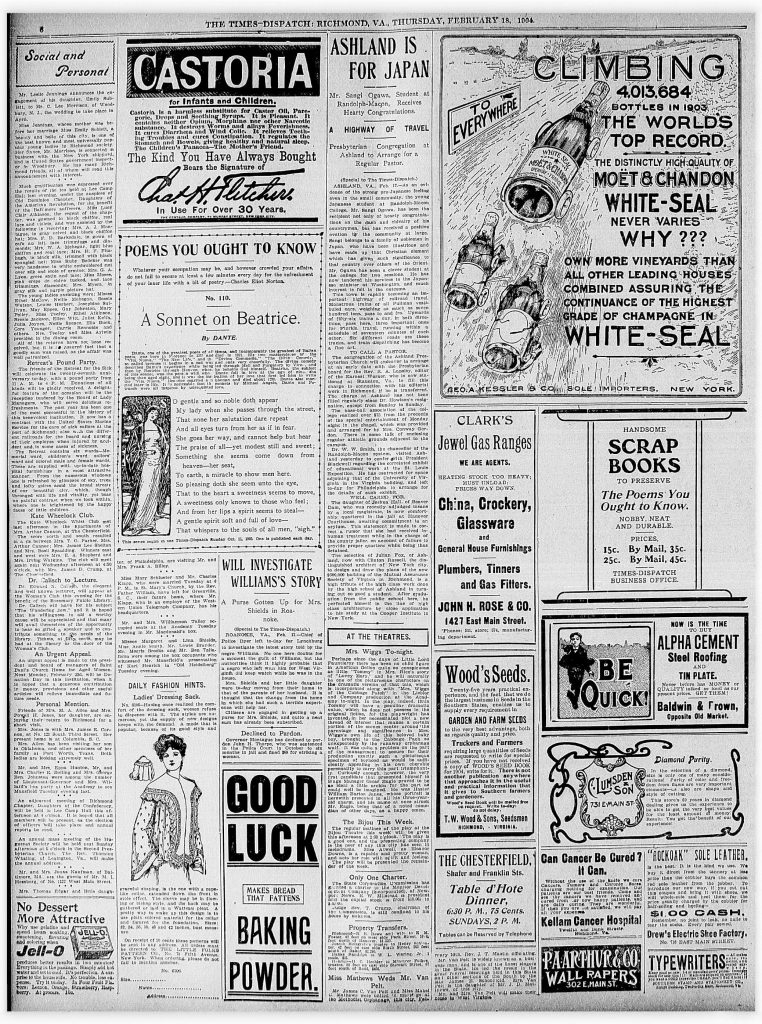
See article, “Ashland is for Japan” on Virginia Chronicle
The Library of Virginia’s Prints and Photographs Collection houses more than 240,000 prints, photographs, postcards, posters, and ephemera items. Over the years, we have digitized not only parts of our own collections, but also some local photograph collections housed at public libraries across the commonwealth. As with all of our digital collections, the digital photograph collections are searchable by keyword, creator, and title.
- APIDA soldiers can be found in the U.S. Army Signal Corps Photograph Collection, which includes photographs from the Hampton Roads Port of Embarkation series, 1942-1946, taken by Army Signal Corps photographers assigned to the port historian’s office. The nearly 3,500 photographs depict the arrival and departure of United States military personnel and equipment, the preparation and loading of war materials, civilian employees, Red Cross workers, wounded personnel, and German and Italian prisoners of war.
- APIDAs can be found in the Adolph B. Rice Photograph Collection, which constitutes a unique photographic record of life in Richmond from 1949 to 1961. The Library offers digital versions of over 400 of the 16,000 images from Rice’s commercial studio, including covering studio portraits, aerial views, advertising shots for local department stores, and local religious and educational events.
Newspapers & Virginia Chronicle
From the Abingdon Virginian to The Zeitgeist, the Library of Virginia collects newspapers across the commonwealth that describe everything from community happenings to notable moments in American history. Many are available on microfilm at the Library of Virginia and researchers can use the “Newspaper Research at the Library of Virginia” to navigate through newspapers in the Library’s collection.
- The Library of Virginia holds microfilm and hard copy versions of Asian Fortune, a periodical from Vienna, Virginia.
Virginia Chronicle provides free access to over one million newspaper pages from the commonwealth and beyond. These full-text searchable and digitized images give glimpses into the lives of Virginians from 1787 to 2013, outlining everything from community happenings to notable moments in American history. Volunteers help correct the text of articles.
- Articles on APIDAs in Virginia can be found by searching in this database. Register for a free account.
Virginia Digital Yearbook Collection
Virginia’s public libraries have banded together to collect digital scans of public high school yearbooks from across the Commonwealth hosted on Internet Archive. Look up family members by using the full-text search.
New Virginians: 1619–2019 & Beyond Exhibition
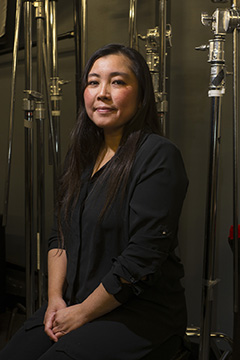
New Virginians: 1619–2019 & Beyond produced jointly by the Library of Virginia and Virginia Humanities, highlights the changing demographics of the commonwealth through a series of interviews with first-generation immigrants and refugees who arrived in Virginia after 1976. This exhibition explores the historical and continuous journey toward the ideals of America and seeks to foster an honest discussion about the immigrant and refugee experience and Virginia’s increasing diversity. The interviews reveal the complexity of the experience for people representing a wide range of personal backgrounds, experiences, ages, and countries of origin—Asia, Africa, Europe, Latin America, and the Middle East. New Virginians is a Legacy Project of the American Evolution, 2019 Commemoration.
APIDA interviewees in New Virginians include:
- Chandra Chhetri, native of Bhutan
- Mohammad Hassanzada, native of Afghanistan
- Xang Mimi Ho, native of Laos
- Kyung Jung, native of South Korea
- Pryalal Karmarkar, native of Bangladesh
- Nhi Le, native of Vietnam
- Dr. Juan Montero, native of the Philippines
- Gankhuyag (Ganna) Natsag, native of Mongolia
- Atif Qarni, native of Pakistan
- Zhiyi (Joycee) Wang, native of China
Virginia Women in History
One of the Library of Virginia’s signature programs, Virginia Women in History (celebrating Women’s History month) has honored three APIDA Virginia Changemakers, who have made a difference in their community, state, and nation.
- Corazon Foley, native of the Philippines
- Pearl Fu, native of China
- Marii Hasegawa, native of Japan
Asian Pacific Islander Desi American (APIDA) Archival Resources at the Library of Virginia
Records that are relevant to APIDA research may be housed at the Library of Virginia or at an off-site facility. Please contact Archives Reference Services for further information. For information about visiting the Library of Virginia, please see our Visitors’ Guide.
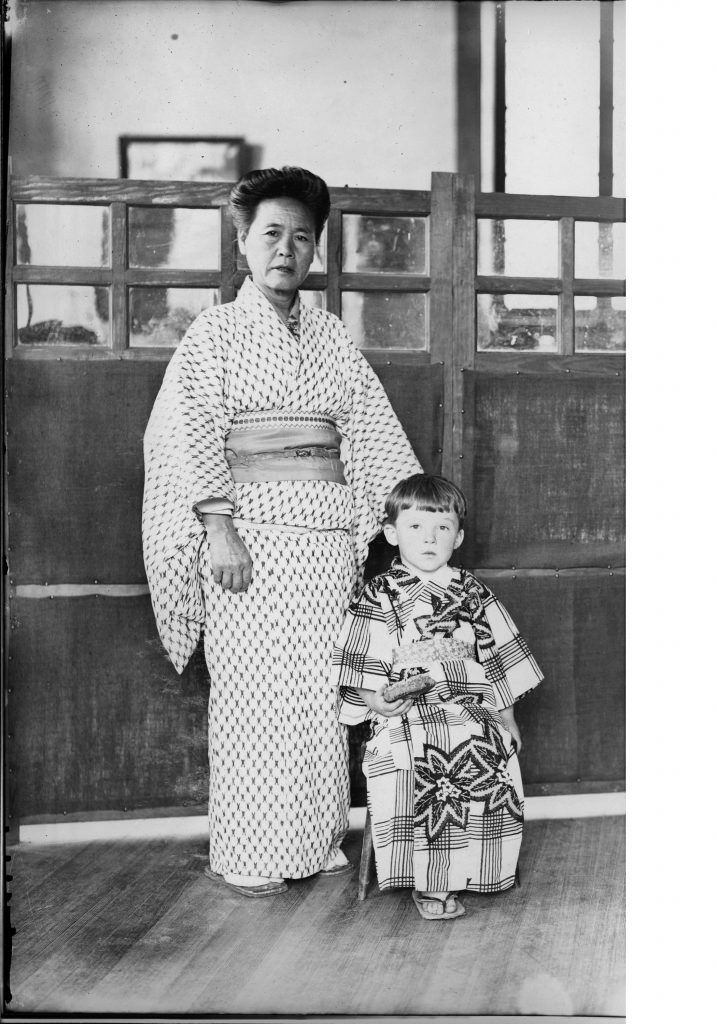
kimonos at St. George’s School
in Norfolk, Virginia.
From the Harry C. Mann
Photograph Collection
The Library of Virginia has limited but significant holdings that document APIDAs and the connections between Asian countries and Virginia’s government and citizens. The original records and manuscripts date from the Colonial Papers’ 1693/4 bond of Thomas Carpenter and Richard Nusum to items that were manufactured in Asia on board the ship Mary and Ellery (Accession 36138) to twenty-first century websites from Virginia’s governors and state agencies. The majority of the manuscripts and records date from the 1940s to the present.
There are several ways to find references to Asia, Asians, and Asian Americans in the Library’s holdings. Records may be found by searching for Asian American or the name of the countries and their people, such as by searching for China or Chinese, in the Library of Virginia’s online catalog and in the finding aids that are available through the Archival Resources of the Virginias website (formerly Virginia Heritage). Archived websites of Virginia state agencies and other digital collections may be accessed through Archive-It.
The full, downloadable pdf guide to these archival sources can be found here.
Below are a few archival resources to get you started. These are just some examples of the types of records that can be found in the Library of Virginia’s collections.
Records of State Agencies and Boards
- Office of the Governor (Record Group 3): may contain documentation of diplomatic and trade missions that includes correspondence, itineraries, photographs, guest lists, menus, and photographs
- Department of the Treasury (Record Group 12): items left behind in safe deposit boxes may be transferred to the Library of Virginia; holdings are cataloged individually and include the 1948 naturalization certificate of Eng Yick Yu (Accession 42943, Lot 4976934) and papers documenting travel from Thailand to the United States of Cambodian refugee Kuy So from the 1980s (Accession 52014, Lot 410 [250078])
- The World War II History Commission (Record Group 68, Accessions 24805, 27544): created to in 1944 to document Virginians’ involvement in World War II; consists of office files, service records of those who died during the war, separation notices of those who sought employment in Virginia following the war, and clippings, diaries, and memoirs of soldiers who fought in the Pacific Theater
- Asian Advisory Board: created in 2001 to advise the governor, their websites are archived by the Library of Virginia, and their work is documented by the General Assembly (Record Group 78), Senate (Record Group 80), and House of Delegates (Record Group 79)
Business and Organization Records
- Universal Leaf Tobacco Company Records, 1904-1995 (Accession 41779): chartered in 1918 after a merger of 6 tobacco companies, this company expanded into China in 1935 and documents its work there primarily through mid-twentieth century financial records
- Pioneer America Society Records, 1929-1984 (Accession 40235): founded to document the United States’ cultural landscape, artifacts, and architecture, as well as to encourage research educational programs, and preservation; records include folders concerning China and Japan
Personal Papers
- Allen Telford Edmunds Papers, 1917-2000 (Accession 43432): document his participation in the World Recreation Congress in Japan and Taiwan in 1964 through a scrapbook and a variety of pamphlets and booklets, some of which are in Japanese
- Covington Family Papers, 1915-1939 (Accession 38905): document James Edward and Annie James Covington’s stay in Shanghai while James Edward Covington was employed by Universal Leaf Tobacco
Records of Military Involvement
- A. Linwood Holton Papers, 1968-1974 (Accession 31535): Japanese language lessons that were used by a future Virginia governor and photographs of Japanese I-400 class submarines that were captured at the end of the war; Governor Holton wrote about his experiences in his autobiography, Opportunity Time
- Charles Hackenburg Collection, 1954-1955 (Accession 41615): documentation of Operation Passage to Freedom and the evacuation of refugees from North Vietnam to South Vietnam during the Korean War
- James Lee Topping Scrapbooks, 1943-1945 (Accession 43893; Miscellaneous Microfilm Reel 5477): scrapbooks document service and travels in New Guinea and the Philippines as a clerk and photographer in the Army Air Forces, 1550th unit
Records from Other Repositories
- William Plummer Buell, 1844 (Accession 41008; Miscellaneous Microfilm Reel 5358): Presbyterian missionary William Buell’s papers include treatises and a book written in Thai, as well as notes on the language; originals held by the Huntington Library
- George F. Davidson Papers, 1748-1887 (Accession 35351; Miscellaneous Microfilm Reel 1404): includes letters from 1880 to 1882 of Presbyterian John W. Davis, who served as a missionary to China, on frames 371 to 381; originals held by Duke University
- Viscountess Nancy Witcher Langhorne Astor Papers, 1879-1964 (Accession 37422; Miscellaneous Microfilm Reel 2134): collection includes a British Parliament subject file on Hong Kong slavery; originals held by Reading University Library
Asian Pacific Islander Desi American (APIDA) Selected Secondary Sources
APIDAs are often overlooked in Virginia’s history. Books, articles and other secondary sources specifically dedicated to APIDAs in the commonwealth are rare. In addition, very few publications address how APIDAs were viewed in the South during the era of “Jim Crow” racial segregation laws. To understand how APIDAs may have navigated life in Virginia, researchers may need to focus on national, regional, and local historiographies and secondary sources, in addition to archival and primary sources.

There are a large number of secondary source publications that can help when researching Asian Pacific Islander Desi Americans (APIDAs) in Virginia. The works listed in the full guide are organized in the following categories: APIDAs Studies in Virginia, Virginia and Southern History, Race Studies, APIDA Studies in the South, and Books on APIDAs, with subcategories on some specific ethnic groups. All of these categories are important when researching APIDAs in Virginia. It is important to note that many Books on APIDAs look solely at the West Coast, however, and tend to generalize national attitudes with little attention to a southern context, particularly in regard to race.
The full, downloadable pdf guide to these secondary sources can be found here.
Asian Pacific Islander Desi Americans (APIDAs) in Virginia
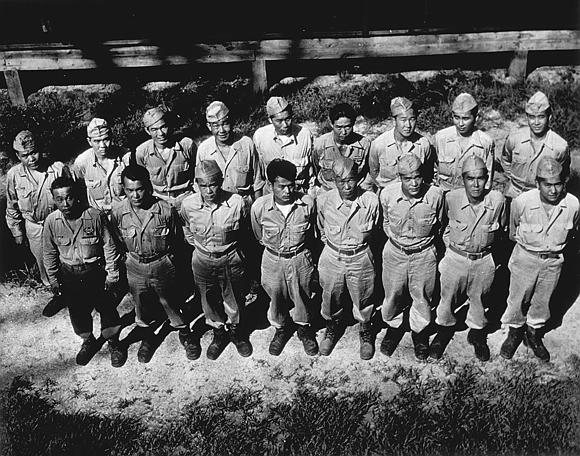
From the U.S. Army Signal Corps Collection
Below are a few resources that specifically focus on APIDAs in Virginia.
Published Books:
- The Fairfax County Asian American History Project: A Contemporary History by Corazon Foley
- Honoring 143 years of Asian Residents in Fairfax County (1867-2010) by Corazon Foley
- Sandoval Stories, 1760s-2013: Filipino American Odyssey from Iloilo, Palawan Manila to Fairfax County, Virginia by Corazon Foley
- VALOR: Asian American Soldiers, Police, Firefighters: Protecting Fairfax County and Our Nation by Corazon Foley
- In Our Aunties’ Words: The Filipino Spirit of Hampton Roads by the Filipino American National Historical Society Hampton Roads Chapter
- How May I Help You?: An Immigrant’s Journey From MBA to Minimum Wage by Deepak Singh
Articles & Webpages:
- “Mongolians Meld Old, New in Making Arlington Home.” Washington Post, July 3, 2006 by Tara Bahrampour
- “Thomas Y. Chin dies, ran Joy Garden restaurant” Richmond Times-Dispatch, October 27, 2011 by Randy Hallman
- “The Japanese Experience in Virginia, 1900-1950s: Jim Crow to Internment” Master’s Thesis by Emma Ito
- Echoes of Little Saigon by Kim O’Connell
- “Remembering alumnus Kim Kyusik, leader of Korean independence movement, 100 years later,” February 28, 2019 by Roanoke College News
- “New Exhibit Uncovers the History of Filipino Nurses in Virginia” UVAToday, July 2, 2019 by Christine Phelan Kueter
- “A Mystery and a Mission: A Woman’s Quest to Discover What Happened to Her Japanese Grandfather After World War II” The Virginian-Pilot, August 18, 2019 by Denise M. Watson
- “The Saving Grace of Spring Rolls” Virginia Humanities, November 2019 by Nora Pherson
- “William & Mary to celebrate 100 years of Asians, Asian Americans,” February 15, 2021 by Erin Zagursky
- ” ‘A Race So Different’ : Asians and Asian Americans in UVA’s History”, March 11, 2021 by Sylvia Chong
- “Acceptable, But not Accepted,” May 11, 2021 by David Bearinger
Asian Pacific Islander Desi Americans (APIDA) in the South
While works dedicated to the history of Asian Pacific Islander Desi American (APIDA) populations in the South as a whole are scarce, some publications can help to interpret what life may have been like for APIDAs in Virginia. These can offer useful case comparisons between attitudes in Virginia and other southern states.
Here are a few secondary resources that specifically focus on APIDAs in the South:
- National Park Service: Asian and Pacific Islanders in the Civil War
- Water Tossing Boulders: How a Family of Chinese Immigrants Led the First Fight to Desegregate Schools in the Jim Crow South by Adrienne Berard
- Partly Colored: Asian Americans and Racial Anomaly in the Segregated South by Leslie Bow
- Jim and Jap Crow: A Cultural History of 1940s Interracial America by Matthew Briones
- Chinese in the Post-Civil War South by Lucy Cohen
- A Different Shade of Justice: Asian American Civil Rights in the South by Stephanie Hinnershitz
- Concentration Camps on the Home Front: Japanese Americans in the House of Jim Crow by John Howard
- The Kikuchi Diary by Charles Kikuchi (edited by John Morell)
- The Mississippi Chinese: Between Black and White by James W. Loewen
- Far East, Down South: Asians in the American South edited by Raymond Mohl and Chizuru Saeki
- Asian Americans in Dixie: Race and Migration in the South edited by Khyati Y. Joshi and Jigna Desai
- Chopsticks in the Land of Cotton: Lives of Mississippi Delta Chinese Grocers by John Jung
- Shades of the Sunbelt: Essays on Ethnicity, Race, and the Urban South edited by Randall M. Miller and George E. Pozzetta
- Lotus Among the Magnolias: The Mississippi Chinese by Robert Seto Quan
- Redefining the Immigrant South: Indian and Pakistani Immigration to Houston during the Cold War by Uzma Quraishi
- Weathering Katrina: Culture and Recovery among Vietnamese Americans by Mark VanLandingham
APIDA Genealogical Resources
The Library of Virginia houses a vast collection of materials and records documenting the lives of Virginians. Delving into those records to explore your family’s history can be an immensely satisfying and rewarding experience. To start organizing your search, here are some tips!
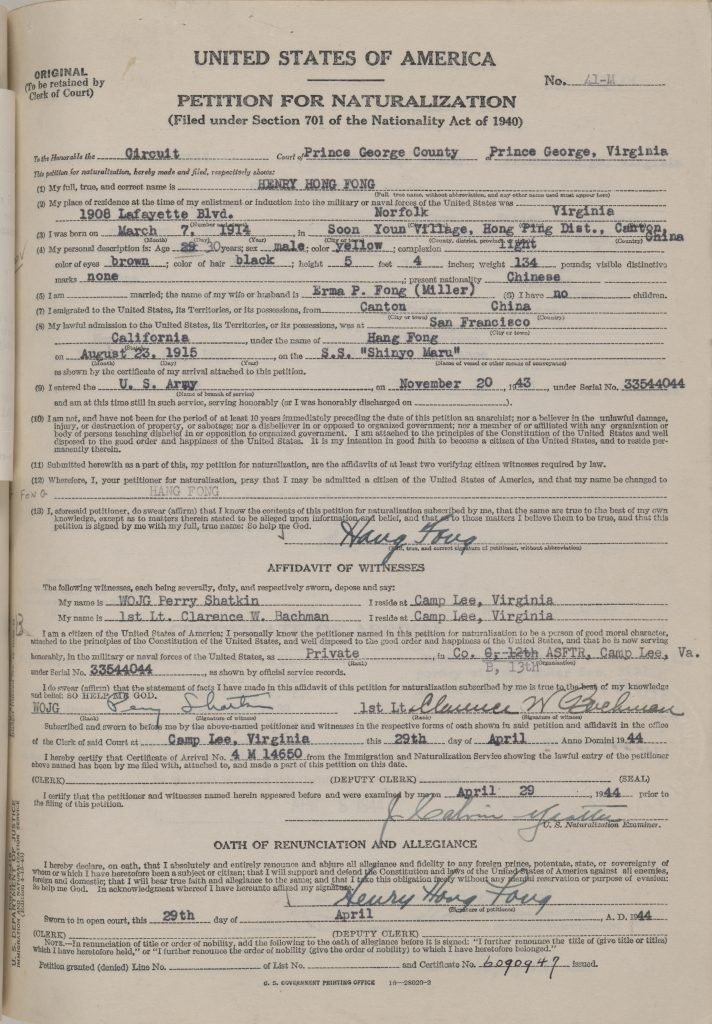
Prince George County, 29 April 1944
- Trace your family history, begin with yourself and work backward, one step at a time.
- Carefully record the important facts of your own life and what you know about your parents and grandparents.
- Consult other members of your family and close family friends and collect the information they know or have gathered. You may find that a family member has saved family papers, newspaper clippings, obituaries, family Bibles, or other treasures.
- Compile a genealogical chart showing the names of your immediate ancestors with their birth, marriage, and death dates, including the places where each event occurred.
- Look for family names in books on local and family history. The Library of Virginia has a large collection of published family histories.
- Search for family records such as census, birth, death, or marriage in online genealogical resources.
- Go to a local library, courthouse, or state archives, or to the National Archives and Records Administration in Washington, D.C. In order to document the history you have heard from relatives or the claims you have found in published and online genealogies, you must search for original records.
- Always record the source of any information found.
Check out our collection of research guides and databases that can help with genealogical research. Reminder: Out-of-state patrons are not able to remotely access the commercial databases the Library offers due to licensing restrictions with those vendors.
Full access to Ancestry.com is also available for use in the second floor reading rooms at the Library of Virginia.
The U.S. Census Bureau provides current and historical population data. They also provide lists of questions asks and guides for census takers on their website.
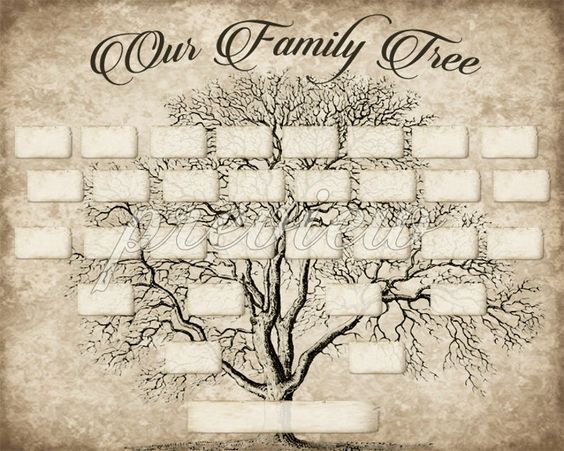
Want a template for your own family tree? Check out our Pinterest board or download one from the Library for illustrating your family history as your work through your genealogy at the Library of Virginia!
Here are more helpful handouts to help guide you on your genealogy journey!
- Finding Your Virginia Roots: The Library’s genealogy Facebook group, provides resources and information for professional genealogists and family historians.
- Genealogical Records at the Library of Virginia
- Lost Records Localities Digital Collection: A collection of images for a wide variety of court records found as part of of local records processing projects. The images are of surviving records from localities where most records are no longer extant.
- Newspaper Research at the Library of Virginia
- Research Guides and Indexes
- Using County & City Records
- Using Vital Statistics Records
- Virginia Naturalizations 1657-1776
- Virginia Naturalizations 1776-1929
We also offer an ongoing series of in-person and virtual workshops to help you with your quest. Geared to all levels of expertise, the workshops explore our collections and offer advice on how to organize your research.
Here are some specific APIDA resources that can help you with your research.
Genealogy Books:
- Asian American Genealogical Sourcebook by Pamela Byers
- Guide to Genealogical Research in the National Archives edited by Anne Bruner Eales and Robert M. Kvansnicka
- Angel Island: Immigrant Gateway to America by Erika Lee and Judy Yung
- Ethnic Genealogy: A Research Guide by Jessie Carney Smith
- They Became Americans: Finding Naturalization Records and Ethnic Origins by Loretto Dennis Szucs
- A Genealogist’s Guide To Discovering Your Immigrant and Ethnic Ancestors by Sharon DeBartolo Carmack
Genealogy Web Resources:
The Digital Resources and Archives located in the “Other Asian Pacific Islander Desi American (APIDA) Digital Resources & Archives” section below can help with researching your genealogy research, as well as these web resources:
- Ancestry
- FamilySearch
- National Archives and Records Administration
- United States Citizenship and Immigration Services
Other Asian Pacific Islander Desi American (APIDA) Digital Resources & Archives
Virginia Specific:
Asian Americans Impacting Virginia: Asian Americans Impacting Virginia (AAIV) was established as a nonprofit organization in 2019 to mobilize Asian Americans to be represented at all levels of leadership in Virginia.
Asian American Society of Central Virginia: promotes unity, harmony, and diversity in the Central Virginia Region through cultural celebrations and active participation in community events and initiatives.
Asian & Latino Solidarity Alliance of Central Virginia: established in 2018, the founding members of ALSACV are leaders and advocates from the Asian and Latino communities in Central Virginia. They have lived in Virginia for a combined total of 150+ years and have a combined history of 120+ years of community service. Many members are gubernatorial appointees who serve or have served on the Virginia Asian Advisory Board and the Virginia Latino Advisory Board to provide input to the Governor’s programs affecting the two communities.
Echoes of Little Saigon: The Arlington County Public Library and master’s degree students from Virginia Tech’s Department of Urban Affairs and Planning (National Capital Region) collaborated on a project to collect the stories of the Vietnamese community who immigrated to, shopped at or owned businesses in Arlington, Virginia’s Clarendon neighborhood when it was known as “Little Saigon” during the late 1970s and early 1980s. The organizers of this project interviewed and recorded stories and collected photos that will be archived at the Arlington County Library’s Center for Local History.
Filipino American Association of Central Virginia: Founded in 1972, FAACV is a non-profit organization dedicated to fostering a sense of Filipino American community and serving the needs of Central Virginia through volunteer works. The FAACV has a remarkable history of providing opportunities for social networking, promoting Filipino American cultural awareness, and volunteerism. Since 1985, the organization has supported the Christian Children’s Fund and has volunteered services to the St. Edward Church’s program to feed the homeless since 1993. FAACV is a member organization of the Asian-American Society of Central Virginia (AASoCV) and continues to support activities across the Asian American cultural spectrum.
Filipino American National Historical Society – Hampton Roads Chapter: The mission of the Filipino American National Historical Society shall be to promote understanding, education, enlightenment, appreciation and enrichment through the identification, gathering, preservation and dissemination of the history and culture of Filipino Americans in the United States.
Hamkae Center (formerly NAKASEC Virginia): NAKASEC VA develops holistic programs and campaigns that are guided by community members, meets immediate needs while building Asian American community power to make long-term systemic changes that address the root causes of these needs, and centers human connections. We believe that Asian Americans, low-income folks, working class people, immigrants, people of color, LGBTQ individuals, and other targeted people must work together in order to have a more just and equitable Virginia for all.
The Richmond Vietnamese Association: The Richmond Vietnamese Association (RVA) is a non-profit organization, with the objective of serving the Vietnamese Community in Richmond. The Association was officially formed on June 15, 2005, and introduced to the community on October 29, 2005. The scope of the Association is to operate in the greater Richmond area and other nearby areas of Virginia. Through conduct, customs and habits of the Vietnamese people, the Association operates with the guideline of maintaining the Vietnamese cultural and moral traditions within the legal framework of the United States, and especially within the rules and regulations of the state of Virginia.
Virginia Asian Advisory Board: The purpose of the Virginian Asian Advisory Board (VAAB) is to advise the Governor on ways to improve economic and cultural links between the Commonwealth and Asian nations, with a focus on the areas of commerce and trade, art and education, and general government; as well as issues affecting the AAPI community in the Commonwealth.
Virginia Asian American and Pacific Islander Caucus: The VAAPIC is an officially recognized legislative caucus of the Virginia General Assembly. Consisting of members of the House of Delegates and the State Senate whose race, ethnicity, or ancestry originate from East Asia, South Asia, Southeast Asia, and Pacific Islands, the purpose of VAAPIC is to promote the equity and well-being of fellow Asian American and Pacific Islander (AAPI) Virginians who share similar backgrounds and interests.
Virginia Asian Chamber of Commerce: The VACC is a voice for the Asian American Pacific Islanders business community in the Commonwealth of Virginia. The diverse group of over 1,500 members in the AAPI business network include AAPI businesses, nonprofits, local governments, federal, state agencies, Fortune 100/500 companies, and more.
Virginia Office of New Americans: The Office of New Americans (ONA) was established in 2020 to promote the economic and civic success of Virginia’s diverse immigrant communities. The Office is comprised of an Immigrant Services unit and Refugee Services unit (formerly known as the Office of Newcomer Services).The Office is responsible for the implementation of a statewide strategy to provide immigrants with comprehensive assistance related to employment, housing, healthcare, education, citizenship and other services for which they may be eligible. The ONA Advisory Board advises Virginia’s Governor on ways to improve state policies and programs to support the integration of immigrants in Virginia.
Virginia University Resources:
William & Mary: Article on W&M’s Asian American History & Recognition and API Major and Minor Program
University of Virginia: Article on UVA’s Asian American history and Asian American Minor Program
National Resources
#Atlanta Syllabus: University of Wisconsin-Madison’s #AtlantaSyllabus was “designed for those who want to better understand this incident and this moment in all of their complexity. While Atlanta is a politically contentious space with rich legacies of Black activism, the presence of Asian Americans in the U.S. South has often been obscured in dominant narratives. Without reducing the city to this tragedy, this syllabus represents a starting point for understanding the incident in relation to Asian American history, culture, and political solidarity with Black communities. Its contents includes canonical and more recent scholarship from the academic discipline of Asian American Studies, as well as contemporary journalism, podcasts, videos, and documentaries from Asian American artists and writers.”
The 1882 Foundation seeks to broaden public awareness of the history and continuing significance of the Chinese Exclusion Act of 1882. They do so by building collaborations and collecting oral histories, but also work to strengthen public education about the Chinese and Asian American experience in looking at curriculum content and resources, teacher workshops, and making materials easily accessible. Among other resources, their site provides lesson plans and digital media.
Asian Americans Advancing Justice: Rooted in the dreams of immigrants and inspired by the promise of opportunity, Asian Americans Advancing Justice | AAJC (Advancing Justice | AAJC) advocates for an America in which all Americans can benefit equally from, and contribute to, the American dream. Our mission is to advance the civil and human rights for Asian Americans and to build and promote a fair and equitable society for all. Advancing Justice | AAJC is a national 501 (c)(3) nonprofit founded in 1991 in Washington, D.C. AAJC also has a number of accounts of Asian Americans experiencing discrimination during COVID-19.
Asian American Drama: contains 252 plays by 42 playwrights, together with detailed, field information on related productions, theaters, production companies, and more.
Asian Voices: Documents relating the Asian American experience from the mid-1800s to the mid-1900s.
Camp Harmony Exhibit: Large numbers of the Japanese American community were sent to American incarceration camps after the bombing of Pearl Harbor. This exhibit tells the story of Seattle’s Japanese American community and one of those camps.
The Chinese in California, 1850-1925: This site illustrates nineteenth and early twentieth century Chinese immigration to California through about 8,000 images and pages of primary source materials.
The Columbia River Basin Ethnic History Archive (CRBEHA): A project of Washington State University Vancouver, the Idaho State Historical Society, Oregon Historical Society, Washington State Historical Society, and Washington State University Pullman, is a database to engage online researchers. The 1,200-mile long Columbia River drains a 259,000-square-mile basin that includes territory in seven states and one Canadian province and a variety of peoples have migrated to this part of the Pacific Northwest over the past two hundred years. This site identifies both Japanese Americans and Chinese Americans in the Columbia River Basin.
Densho works to preserve and share the history of the WWII incarceration of Japanese Americans to promote equity and justice today. The digital archives page documents the testimonies of Japanese Americans who were unjustly incarcerated during World War II and offers irreplaceable firsthand accounts, coupled with historical images and teacher resources, to explore principles of democracy, and promote equal justice for all.
The Japanese American Evacuation and Resettlement: A Digital Archive: Daily journals, field reports, life histories, and secondary research materials. There is also extensive correspondence between staff, evacuees, and others.
Japanese American National Museum: The mission of the Japanese American National Museum is to promote understanding and appreciation of America’s ethnic and cultural diversity by preserving, interpreting, and sharing the experiences of Japanese Americans.
Japanese American Relocation Digital Archive: Documents the experience of Japanese Americans in WWII incarceration camps. Primary source materials include photographs, documents, manuscripts, paintings, drawings, letters, and oral histories.
Korean American Digital Archive (KADA): Created by the University of Southern California, the KADA brings together documents, photographs, and sound files that document the Korean American community during the period of resistance to Japanese rule in Korea and reveal the organizational and private experience of Koreans in American between 1903 and 1965.
Mississippi Delta Chinese Heritage Museum: Their primary goal is to collect objects, photographs and any other memorabilia which would help tell the story of Chinese legacy in the Mississippi Delta
The Museum of Chinese in America (MOCA): Dedicated to preserving and presenting the history, heritage, culture, and diverse experiences of people of Chinese descent in the United States. MOCA has a number of digital collections and educational resources available online.
National Council of Asian Pacific Americans: The National Council of Asian Pacific Americans (NCAPA), founded in 1996, is a coalition of 46 national Asian Pacific American organizations around the country. Based in Washington D.C., NCAPA serves to represent the interests of the greater Asian American (AA) and Native Hawaiian Pacific Islander (NHPI) communities and to provide a national voice for AA and NHPI issues.
The Nikkei Newspapers Digital Archive: Provides access to two significant newspapers which tell the story of Japanese immigration and Japanese American community life in Seattle and beyond, from 1902 to 1950, and continuing to the present day.
The Orange Story is a digital humanities project that uses narrative film and primary sources to create an empathetic educational experience to teach the history of Japanese and Japanese American incarceration during World War II. Created specifically for high school and college classes, this experience can serve as a launching point for more in-depth discussion. Suggested questions and links to more resources and curricula are provided in the Teacher’s Resources section. Citations for the archival materials are also provided, and are available both by chapter or type of material. Additional resources are available on the Library of Virginia’s Civic Conversations page.
Pioneering Punjabis Digital Archive: Documents the history of South Asian immigrants from the Punjab region in north India to California, 1899-present.
South Asian American Digital Archive: Documents, preserves, and shares stories that represent the unique and diverse experiences of South Asian Americans.
Southeast Asian Archive: This Archive collects materials relating to the resettlement of Southeast Asian refugees and immigrants in the United States, and the culture and history of Cambodia, Laos, and Vietnam.
South Asian American Digital Archive: SAADA is a community-based culture change organization ensuring that South Asian Americans are included in the American story: past, present, and future.
The Smithsonian Asian Pacific American Center brings community-focused Asian Pacific American history, art, and culture through innovative virtual museum experiences. They also offer a number of educational resources to support educators, students, families, and lifelong learners.
University of Southern California Asian American Studies Guide: This guide has a number of excellent primary and secondary resources linked. With a Library of Virginia card, you can access a many of the academic databases listed.
Yuri Education Project: YURI provides educational resources and experiences through an Asian American lens. By expanding the narratives of history, YURI believes knowledge can create bridges rather than division and aims to teach the power of coalition building to create understanding across diverse communities. YURI develop pedagogies that deepen comprehension of our society, cultivate empathy, and encourage learners to draw connections between history and the present.

